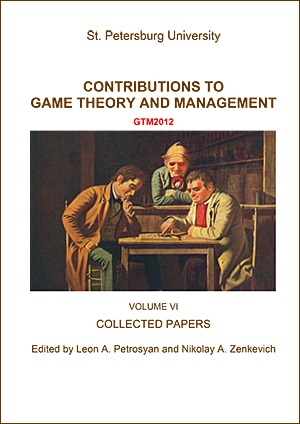Differential Games with Random Terminal Instants
Abstract
We investigate a noncooperative differential game with two players. Each player has his own random terminal time. After the first player leaves the game, the remaining one continues and gets the final reward for winning. An example is introduced where two firms compete in extracting a unique nonrenewable resource over time. The optimal feedback strategy, i.e. the optimal extraction rate, is calculated in a closed form.
Keywords:
Differential game, random terminal time, Hamilton-Jacobi-Bellman equation
Downloads
References
Borovkov, A. A. (1999). Probability Theory. CRC Press, 484 p.
Dockner, E., S. Jørgensen, N. Van Long, G. Sorger (2000). Differential games in economics and management science. Cambridge University Press.
Jørgensen, S. and G. Zaccour (2007). Developments in Differential Game Theory and Numerical Methods: Economic and Management Applications. Computational Management Science, 4(2), 159–182.
Kostyunin, S., A. Palestini and E. Shevkoplyas (2011). Differential game of resource extraction with random time horizon and different hazard functions. Control Processes and Stability: proceedings of XLII international conference / Ed. by A.S. Eremin, N.V. Smirnov. Saint-Petersburg, Saint-Petersburg State University Publishing House, 571–576.
Kostyunin, S. and E. Shevkoplyas (2011). On simplification of integral payoff in the differential games with random duration. Vestnik St. Petersburg University. Ser. 10, Issue 4, 47–56.
Marin-Solano, J. and E. Shevkoplyas (2011). Non-constant discounting in differential games with random time horizon. Automatica, vol.48, 50, 2011. DOI: 10.1016/j.automatica.2011.09.010
Petrosjan, L. A. and G. Zaccour (2003). Time-consistent Shapley Value Allocation of Pollution Cost Reduction. Journal of Economic Dynamics and Control, 27, 381–398.
Petrosjan L. A. and E. V. Shevkoplyas (2003). Cooperative Solutions for Games with Random Duration. Game Theory and Applications, Vol. IX. Nova Science Publishers, 125–139.
Rubio, S. (2006). On Coincidence of Feedback Nash Equilibria and Stackelberg Equilibria in Economic Applications of Differential Games. Journal of Optimization Theory and Applications, 128(1), 203–221.
Downloads
Published
How to Cite
Issue
Section
License
Articles of "Contributions to Game Theory and Management" are open access distributed under the terms of the License Agreement with Saint Petersburg State University, which permits to the authors unrestricted distribution and self-archiving free of charge.




